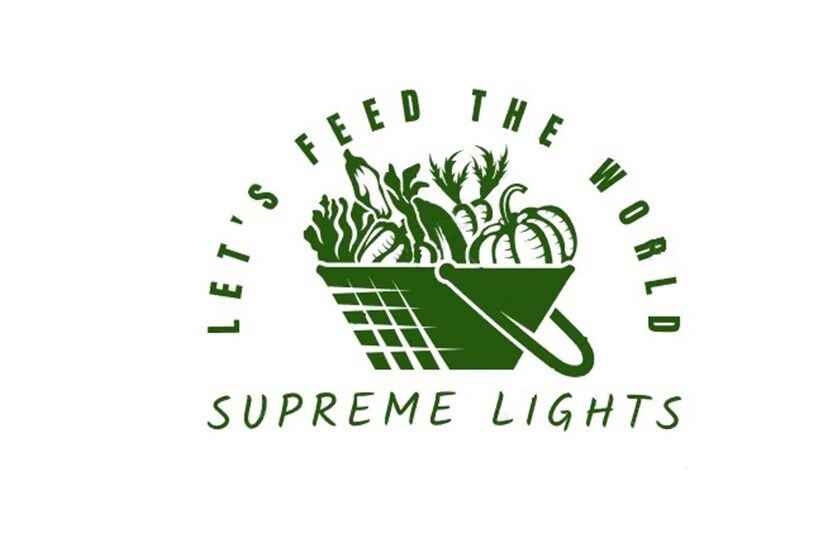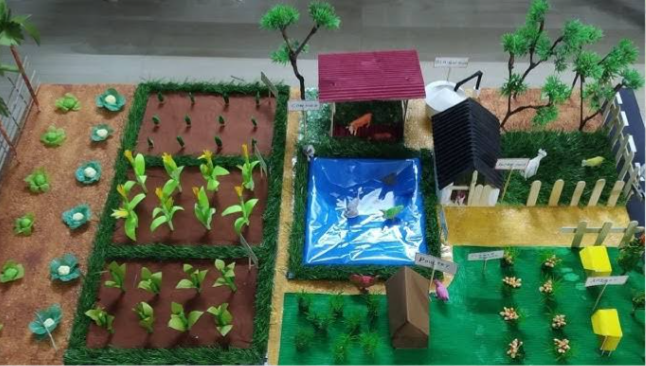
Integrated farming system also called integrated Agriculture is a sustainable farming system that combines the production of crops, livestock and other organisms in a mutually beneficial way. The other organisms include fish, snails, honeybees etc. It is based on the concept that waste produced by one component (or enterprise) becomes an input for another component ( enterprise) in the system. It is an approach that focuses on minimising the benefits of ecological interactions between different agricultural components while minimizing negative environmental impacts. Some of the components of IFSs are: field crops like cereals, legumes etc, horticultural crops (fruits, vegetables, ornamental crops, plantation crops, etc.), livestock (cows, sheep, goats, pigs, poultry, duckery, rabbitry) , fishery, agroforestry (timber, and fruit trees etc), apiary, mushroom cultivation, biogas , kitchen garden, medicinal garden, fodder production, vermiculture, vemicomposting , and nursery etc
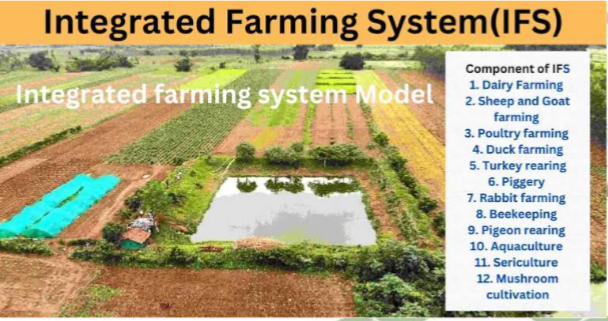
An example of integrated farming system that involve the following components ‘ poultry, fishery, plantation crops, composting’ can be explained thus. Poultry produces droppings. Part of the poultry dropping can be turned to farmyard manure which is used to fertilize the fish pond and the plantation crops. While the remaining parts used for composting. Water from the fish pond can be used to irrigate the plantation crops. Also, fruits and litters from the plantation crops can be fed to the poultry and fishes and for composting respectively. From this example, a mutual relationship had being developed between all the components. Thus, reason why integrated farming system is referred to as multiple enterprise system with synergistic resource transfer among components. In the systems, there is less dependency on external inputs. This gives reason why it is also referred to as sustainable approach to agriculture which can assist in maintaining farmer’s income and safeguard the environment.
GOALS OF INTEGRATE FARMING SYSTEM (IFS) The concept of IFS defines the way to maximize profit in agriculture. The goals are: 1. Enhancing high productivity of the components per unit area. 2. Reducing the use of Agrochemicals 3. Soil health management. 4. Proper waste management 5. Maximisation of all components yield in the system. 6. Continuous generation of income by farmers through out the year.
PRINCIPLES OF IFS
1. optimization of the use of resources, 2. reduce waste, 3. enhancement of overall farm productivity. DIFFERENCE BETWEEN INTEGRATED FARMING SYSTEM, FARMING SYSTEM AND MIXED FARMING.
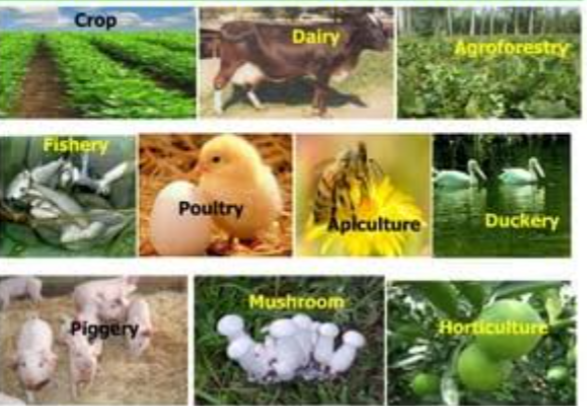
Farming systems, mixed farming and integrated farming are synonymous to one another. Most people do believe the terms have the same meaning, but there are clear differences. Mixed farming and IFS may be synonymy but in IFS, the focus is on interaction among the components that make up the system and the linkage in the systems brings about recycling of wastes and by-products within the systems. While in mixed farming, no synergism occur among the component in the farming enterprise. In the case of farming system, all IFSs are farming systems, while all farming systems are not IFSs. In IFS, each component must be well designed so that they can fit properly into the farming system. An ideal IFS must satisfy the following five basic conditions: (1) economic feasibility; (2) nutritional security; (3) environmental sustainability; (4) energy self-sufficiency; and (5) climatic adaptability.
IMPORTANCE OF INTEGRATED FARMING SYSTEM
1. MAXIMISING PRODUCTION : IFS is designed to optimise the use of natural resources, reduce waste and maximise productivity. By combining different agricultural components, farmers can create a balance and diversify ecosystem that provide multiple benefits. For example, livestock can provide manure which can be converted to fertilisers for crop usage. While Inturn, plants can provide feed for the farm animals. This approach can allow farmers to increase their overall productivity while reducing their reliance on external inputs. 2. ENVIRONMENTAL SUSTAINABILITY : IFS is inherently sustainable as it minimises the negative environmental impact on agriculture by using natural resources efficiently, reducing waste and enhancing biodiversity. Integrated farming helps to maintain a healthy ecosystem. This Inturn helps to protect the soil, water and air which are essential for long term viability of Agriculture. 3. ECONOMIC VIABILITY : IFS can be economically viable for farmers as they can reduce production cost and increase profitability. By reducing the need for external inputs, such as fertilizers and pesticides, farmers can safe money on production cost. Integrated farming can increase the value of farm production by providing higher quality and more diverse offspring s which command a premium price in the market. 4. SOCIAL BENEFITS : IFS can have positive social impact by providing employment opportunities and supporting rural communities. These systems can create a range of jobs from animal husbandry to crop cultivation which can help to generate income for farmers and their families. Additionally, IFS can help to revitalise rural communities by providing a range of services and amenities such as education, health care, pipe borne water, and recreational opportunities. 5. CLIMATE CHANGE MITIGATION: IFS can help to mitigate the impact of climate change by reducing green house gas emissions and increasing carbon sequestration. By reducing the use of synthetic fertilizers and pesticides, integrated farming can help reduce nitrous oxide, important to green house gas.Additionally, by increasing the diversity of crops and Livestock. Integrated farming system can help to sequester carbon in the soil which can help to mitigate against climate change.
ADVANTAGES OF INTEGRATED FARMING SYSTEM
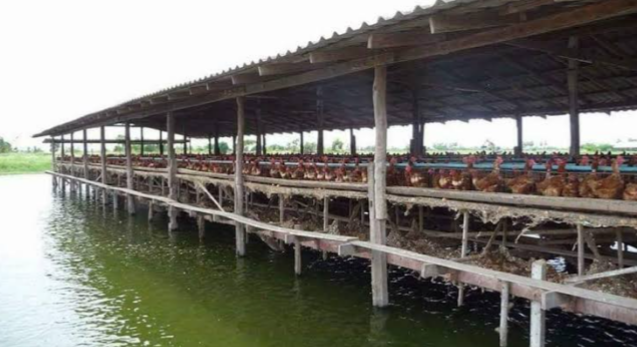
The following are advantages of IFS:
1. RESOURCE OPTIMIZATION : The available resources from the components in IFS are utilized maximally to their full potential . Waste products from one enterprise is used as inputs for another enterprise (or component) . For example, livestock waste can be used as organic fertilizer for crop production, and inversely, crop residues can be used as feed for livestock. Waste generated by the enterprises that can lead to environmental pollution are reduced and resource efficiency are totally maximized.
2. ENHANCED NUTRIENT CYCLING TO CREATE A HEALTHY SOIL : The interconnection between enterprises integrated together in a farming system promotes nutrient cycling. Animal manure and crop residues are recycled back into the system. The decomposition of these two wastes improve soil fertility and soil health with organic matter and essential nutrients. This leads to healthier and more productive crops. This reduces the dependence on synthetic fertilizers and poor soil structure.
3. INCREASED INCOME AND DIVERSIFICATION : Income realised by farmers in Integrated farming can be diversified into multiple agricultural activities. Farmers can generate revenue from the sales of one or more enterprise(s) and use it for expansion or establishment of another enterprise. Diversification in IFS reduces the risk of failure of components or market fluctuations and provides a more stable income for farmers.
4. INCORPORATION OF BENEFICIAL COMPONENTS : Components within the system play various roles in improving the Integrated farming practices. For example, agroforestry and the use of cover crops, help prevent soil erosion and improve soil structure. Trees and vegetation in agroforestry systems act as windbreaks and shade, reducing evaporation and conserve Water . Also, plant parts such as leaves from the trees and residue from the vegetation that fall to the ground will decompose to improve soil fertility. Livestock within the system can be used to control Weeds, pests and provide manure for biogas and other means
5. SUSTAINABLE LAND MANAGEMENT :These practices contribute to sustainable land management and mitigate the negative environmental impacts of conventional agriculture.
6. PEST AND DISEASE MANAGEMENT : Integrated farming systems had provided solutions to problems caused by the use of agrochemicals like chemical pesticides and fertilizers and promotes a more environmentally friendly approach to pest management and pollution caused by these chemicals in the environment . Natural pest and disease control methods are being adopted. Organic fertilisers are utilized. For instance, certain crops can be intercropped to confuse pests or repel insects. Organic pesticides from natural source, Cover crops, plastic mulch and some livestock species etc can control weed growth.
7. IMPROVED SOIL AND WATER CONSERVATION : Integrated farming practices, such as agroforestry, use of cover crops, mulching, application of organic manures produced by the components etc can help prevent soil erosion, leaching of nutrients, and improve soil structure etc. When the soil is rich in humus produced from the components, the soil will conserve or retain enough water required for plant growth and development.
8. CONTINUOUS INCOME GENERATION THROUGH OUT THE YEAR : Integrated farming of different agricultural components such as crops, livestock, mushroom, honey, fishery, cocoons silkworm etc. Will bring about a continuous in flow of income to the farmer all year round even if failure is experienced from one of the components.
9. SOURCE OF BALANCED NUTRIENT: : Produce from components used in integrated farming such as eggs, milk, meat, fruits, grains, etc provides different sources of balanced nutrition on the table of man. It provides carbohydrates, protein, vitamin, fat and oil, minerals, and clean water needed for healthy growth and development.
10. PROFITABILITY : In Monocropping or Monoculture in which a single agricultural component is farmed, farmers can experience failure. But through integrated farming, waste material of one component can be used for another component. This reduces cost of production. Thus, reduction of cost of production due to utilization of waste material, removal of agrochemicals, reduction in component failure etc all result in increase in profitability.
DISADVANTAGES OF INTEGRATED FARMING SYSTEM
1. INVASIVE DISEASES
The disease from one animal or plant might invade the farm and not be compatible with another specie. One species may host pathogens and transit disease to another easily. This can cause a total farm failure
2. DECREASED LEVEL OF PRODUCTION
compared to Monoculture, the level of production in integrated farming is low. In monoculture, all resources are focused on one effort. However, in integrated farming, it is diversified by planning.
3. COMPLEX MANAGEMENT : In Integrated farming management of both crops and livestock together, may be labourous. Experts with Knowledge and skills from different areas, such as animal husbandry, agronomy and farm management will be required to manage the different components in the integrated farming.
4. HIGHER INVESTMENT AND OPERATIONAL COSTS : The initial investments to set up integrated farming may be high. But in due time the farmer will recoup back his investment. The farmer needs to procure various inputs that will bring about the success of the farming practices. Such inputs include varieties of equipment and resources, which can raise the costs of production. Resources also include time, cash, land, Labour, etc to pull off.
5. INCREASED WORKLOAD AND LABOR REQUIREMENTS : Integrated farming require more human power to achieve the success of such farming practices. The Farmers need skilled labourers to manage every enterprises available in the farming activities. This can lead to increased in cost of production. Due to the principle of reduction in production cost, most farmers will prefer reducing the numbers of labour thereby workload increases per labourer.
6. NUTRIENT IMBALANCES IN THE SOIL : In integrated farming systems, plant residues, animal waste and their byproducts are often used as fertilizers for crops. When the amount of nutrients in the soil are not determined before application of these fertilisers, crops can be harmed. Overuse of organic inputs may result in nutrient imbalance in the soil. Therefore, soil analysis can help solve the problem of nutrient imbalance.
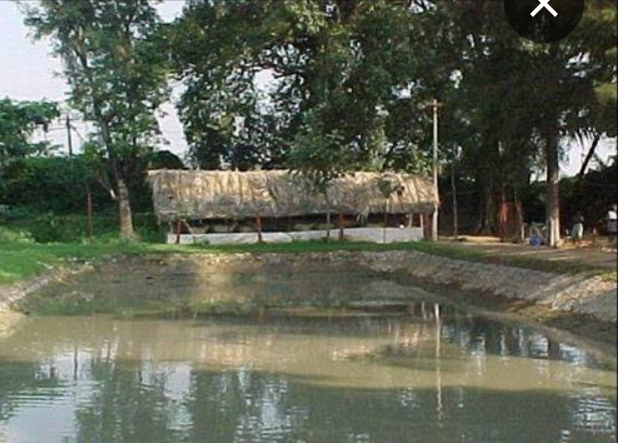
In conclusion, Integrated farming system (IFS) is a sustainable and holistic approach to agriculture. It offers a range of benefits such as maximising production, enhancing environmental sustainability, increasing economic viability, providing social benefits and mitigating the impact of climate change.
Integrated farming help to create a more sustainable and more resilience agriculture. All the different components combine into a unified and synergistic system to bring about a successful, a self-sustaining and efficient farming practices.
